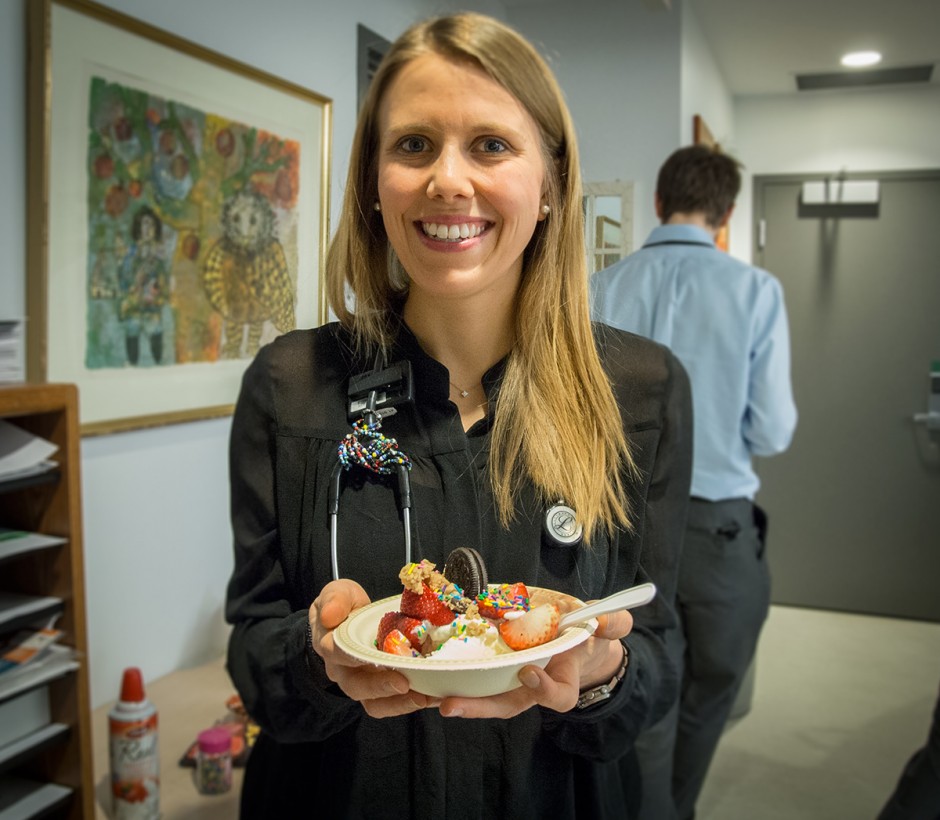
Megan Kilvert
Once every two or three months, first-year pediatric residents converge in BC Children’s Hospital’s resident lounge for an elaborate ice cream buffet. Packages of gummy worms, bottles of chocolate sauce and other sugary fixings line the table, waiting to be piled on top of the young doctors’ sundaes.
At a first glance, the gathering may seem like an excuse to indulge in an unhealthy treat. But this resident meeting is all about health: their mental health.
The pressures and stress associated with medical residency, and the unique aspects of being a pediatric resident, bring their own challenges. So Megan Kilvert, a first-year resident, started the Ice Cream Rounds — a confidential, resident-only forum to discuss the highs and lows of residency. The gathering is supported by UBC’s newly created Postgraduate Resident Wellness Office.
“We are extremely dedicated to the mental health of our residents,” says Roger Wong, Associate Dean of Postgraduate Medical Education. “It is important for them to be able to talk through any issues they may be going through and to know they are not alone.”
Through the Resident Wellness Office, residents can seek out counselling services, find information and resources about mental health and wellness, and make connections with fellow residents from different backgrounds.
Each Ice Cream Rounds session, which take place once every two to three months, is facilitated by Rebecca Turnbull, a Registered Clinical Counsellor for the Resident Wellness Office.
“I’m really here to hold the space and facilitate supportive conversation and connection in a safe and confidential manner,” Turnbull says. “However, for the most part, the group leads itself. These young doctors are truly interested in supporting and encouraging one another through, what can often be, a personally trying time in their professional lives.”
As Dr. Kilvert and her colleagues tuck into their treats, Turnbull gets ready to start the session.
“The ice cream is fun, but these sessions are really about starting an important conversation and sharing experiences,” Dr. Kilvert says. “I would love to see this idea spread to other programs across the province. I think it builds a real sense of camaraderie and collegiality amongst a group.”
A brief question-and-answer with Dr. Kilvert:
What are the Ice Cream Rounds? Who is involved and how often do you meet?
MK: Ice Cream Rounds is a completely confidential, resident-only forum to discuss the challenges of residency: coping with reduced personal time and increased responsibility, caring for patients with severe illnesses, encounters with death, etc. The participants are interested residents from all years of our pediatric training program. We aim to meet every other month. We are extremely lucky to have Rebecca Turnbull (UBC Wellness Counsellor) to facilitate these sessions. It is a space for us to vent, talk, share and support each other. There is no agenda. People are welcome to participate as much or as little as they like. And as the name suggests, an elaborate ice cream sundae bar is provided!
How did this initiative get started?
MK: It is a borrowed idea. A similar initiative exists within the pediatric programs in Ottawa and Toronto. I have a strong interest in resident wellness and this is the first of several ideas that I hoped to put into action. I was lucky to get a lot of support from our program directors and fellow residents, so executing the idea turned out to be very easy.
What do you feel are the benefits of these meetings?
MK: First, I think that the presence of wellness related initiatives, like Ice Cream Rounds, is an important way for a program to acknowledge that residency is an incredibly stressful and demanding time. It is a way for the program to send a message that self-care and personal wellness is valued.
Second, the sessions are a place for residents to connect over shared experiences and support each other. It helps us to appreciate that we are not alone in the challenges we have faced. And I think it builds a real sense of camaraderie and collegiality among our group.
Finally, it is a proactive way to address resident well-being. There are a lot of resources and support for when you are in “crisis mode”. But it’s critical to prevent things from getting there. I think creating an environment where residents can address some of their stressors in a healthy way protects them emotional burn out.
What is your hope for the future of these meetings?
MK: I hope that these sessions acquire a permanent place in the program curriculum. And I would love to see this idea adopted by other programs. The emotional challenges of residency certainly aren’t unique to pediatrics. I also hope for a bit of funding so that I can buy fancier ice cream.